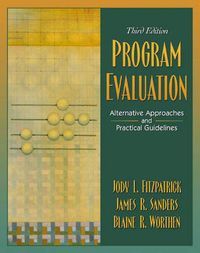
1 säljare
Program Evaluation Upplaga 3
I like this book because it is very practical. Even non-evaluators can easily understand how to do an evaluation from reading this book. The authors take an eclectic approach rather than being wedded to one specific approach to evaluation.
Susan B. Twombly University of Kansas
The most comprehensive text on the market, Program Evaluation: Alternative Approaches and Practical Guidelines, 3/e provides an overview of a wide variety of approaches to evaluation and extensive practical guidelines for carrying out evaluation studies successfully. This text helps both students and professionals who are new to evaluation to understand how the field has evolved, what different approaches an evaluator can take in conducting evaluations, and how to plan and conduct an evaluation. The text makes extensive use of checklists, examples, and a comprehensive case study. Finally, throughout the book, students are introduced to current trends and controversial issues in evaluation and ways to conduct evaluations in an ethical and professional manner.
New to This Edition
Use of technology, from web-based surveys to qualitative data analysis, is addressed throughout the text and an appendix lists web sites with evaluation-related information. The methods chapters have been revised so that they no longer separate qualitative and quantitative methods, but instead integrate these methods and follow the logical sequence of choices in methods; design, sampling, and data collection. For increased ease of use, tables and figures have been added to most chapters in the text. Content is up-dated throughout the text to include new findings and controversies such as advocacy in evaluation. This discussion will help students learn more about their role as advocates versus neutral evaluators.
Upplaga: 3e upplagan
Utgiven: 2003
ISBN: 9780321077066
Förlag: ALLYN BACON
Format: Inbunden
Språk: Engelska
Sidor: 576 st
I like this book because it is very practical. Even non-evaluators can easily understand how to do an evaluation from reading this book. The authors take an eclectic approach rather than being wedded to one specific approach to evaluation.
Susan B. Twombly University of Kansas
The most comprehensive text on the market, Program Evaluation: Alternative Approaches and Practical Guidelines, 3/e provides an overview of a wide variety of approaches to evaluation and extensive practical guidelines for carrying out evaluation studies successfully. This text helps both students and professionals who are new to evaluation to understand how the field has evolved, what different approaches an evaluator can take in conducting evaluations, and how to plan and conduct an evaluation. The text makes extensive use of checklists, examples, and a comprehensive case study. Finally, throughout the book, students are introduced to current trends and controversial issues in evaluation and ways to conduct evaluations in an ethical and professional manner.
New to This Edition
Use of technology, from web-based surveys to qualitative data analysis, is addressed throughout the text and an appendix lists web sites with evaluation-related information. The methods chapters have been revised so that they no longer separate qualitative and quantitative methods, but instead integrate these methods and follow the logical sequence of choices in methods; design, sampling, and data collection. For increased ease of use, tables and figures have been added to most chapters in the text. Content is up-dated throughout the text to include new findings and controversies such as advocacy in evaluation. This discussion will help students learn more about their role as advocates versus neutral evaluators.
Begagnad bok
899 kr
Fri frakt & skickas inom 1-3 vardagar
Köpskydd med Studentapan
Varje köp täcks av Studentapans köpskydd som säkerställer att boken kommer fram, att du får rätt bok och att skicket stämmer överens med beskrivning.



